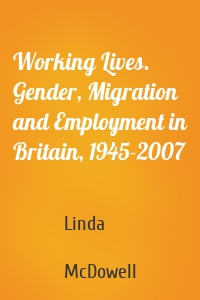Linda McDowell
5 кн.
Working Lives. Gender, Migration an...
Full of unique and compelling insights into the working lives of migrant women in the UK, this book draws on more than two decades of in-depth research to explore the changing nature of women’s employment in post-war Britain. A first-rate example of theoretically located empirical analysis of labour market change in contemporary Britain Includes compelling case studies that combine historical documentation of social change with fascinating first-hand accounts of women’s working lives over...
| Автор | Linda McDowell |
Gender, Identity and Place. Underst...
Feminist approaches within the social sciences have expanded enormously since the 1960s. In addition, in recent years, geographic perspectives have become increasingly significant as feminist recognition of the differences between women, their diverse experiences in different parts of the world and the importance of location in the social construction of knowledge has placed varied geographies at the centre of contemporary feminist and postmodern debates. Gender, Identity and Place is an...
| Автор | Linda McDowell |
Working Bodies
Through a series of case studies of low-status interactive and embodied servicing work, Working Bodies examines the theoretical and empirical nature of the shift to embodied work in service-dominated economies. Defines ‘body work’ to include the work by service sector employees on their own bodies and on the bodies of others Sets UK case studies in the context of global patterns of economic change Explores the consequences of growing polarization in the service sector Draws on geography,...
| Автор | Linda McDowell |
Redundant Masculinities?
Redundant Masculinities? investigates the links between the so-called 'crisis of masculinity' and contemporary changes in the labour market through the lives of young working class men. Allows the voices of poorly-educated young men to be heard. Looks at how the labour market is changing. Emphasises the social construction of gender and racial identities. Dispels popular myths about the crisis in masculinity.
| Автор | Linda McDowell |
Capital Culture
The changing nature of waged work in contemporary advanced industrial nations is one of the most significant aspects of political and economic debate. It is also the subject of intense debate among observers of gender. Capital Culture explores these changes focusing particularly on the gender relations between the men and women who work in the financial services sector. The multiple ways in which masculinities and femininities are constructed is revealed through the analysis of interviews with...
| Автор | Linda McDowell |






